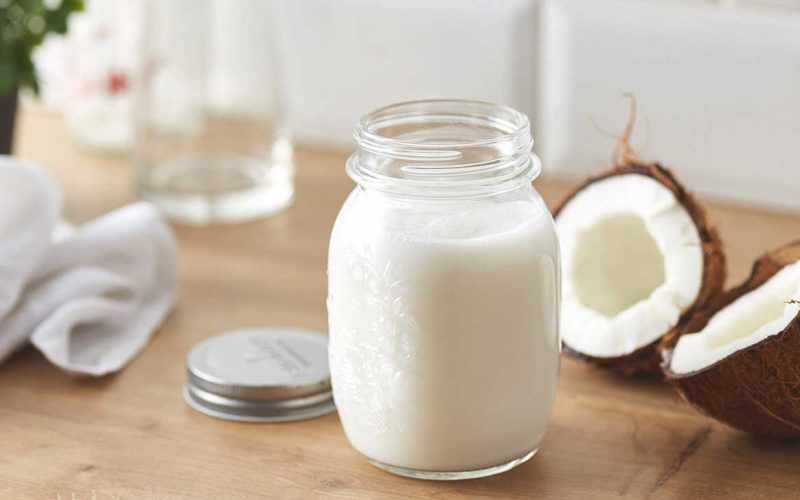Milk is an excellent source of nutrients, including Calcium, protein, vitamin D, and Selenium.
It is a staple meal many worldwide enjoy, the most common being cow milk.
However, other non-animal milk sources include almond, coconut, soy, and rice milk.
These are all alternative plant-based milk sources and are popular, especially among those with dietary or allergy concerns.
Also, part of the reason for the popularity of plant-based milk is the growing worry over milk from industrialized dairy farms.
There have been reports of hormones and antibiotics administered to cows and animal mistreatment.
Additionally, environmental pollution from manure runoff is something to worry about.
Almond and coconut milk are lactose-free vegan alternatives to cow milk that are fast becoming popular and easily accessible.
There may be a noticeable difference in the ingredients, how they are made, and their nutritional benefits, which can help you make the best choice for your diet.
Almond Milk
Almond milk is made from toasted and finely-grounded almonds. The almonds are ground into a powder-like consistency and then blended with filtered water.
Almond milk contains some natural vitamins, which are also added during the blending process.
Unsweetened almond milk is typically lower in calories than other types. It is also lactose-free and contains no saturated fat.
A cup of unsweetened almond milk contains:
- 1 gram of protein
- 1 gram of carbohydrates
- 3 grams of fat
- About 30 to 60 calories
Benefits and Limitations of Almond Milk
Almond milk contains omega-3 fatty acids necessary for a healthy heart. It also contains vitamin E, an antioxidant, and is naturally low in sugar.
Almond milk is easily accessible and available in a variety of flavors.
Although almonds are rich in nutrients like protein and fat, almond milk is not considered a source of protein.
This is because almonds are stripped of many nutrients while preparing the milk.
Another lost nutrient is Calcium – you should ensure you get Calcium in your diet from other foods.
You can also search for brands that add calcium as a supplement to almond milk.
Coconut Milk
Coconut milk is made from the white fleshy parts of a mature coconut. It differs from coconut water, which is found naturally in coconuts.
The milk has a thick, creamy, milky consistency and is a common ingredient in Thai and Southeast Asian cuisines.
It is also popular in Hawaii, India, and some Caribbean and South American countries.
Coconut milk is produced from coconut cream and filtered water. The cream is made from the grated flesh of matured.
Coconut milk is more commonly referred to as “coconut milk beverage” because it is a more diluted product than the type of milk used to cook, typically sold in cans.
As with other plant-based milk alternatives, thickeners and other ingredients are often added to coconut milk.
A cup of unsweetened coconut milk beverage contains:
- 5 grams of fat
- 0 grams of protein
- 2 grams of carbohydrates
- About 50 calories
Coconut milk is high in fat compared to other plant-based alternatives. It contains 18.91 grams of saturated fat, 0.901 of monounsaturated fat, and 0.233 grams of polyunsaturated fat.
These values, however, are for thick coconut milk produced from the first pressing.
Calcium, Vitamin A, or Vitamin D are not naturally present in coconut milk beverages. However, they can be fortified with these.
Benefits and Limitations of Coconut Milk
Coconut milk benefits lactose-intolerant people and people who are allergic to dairy products. It can also be consumed by patients receiving chemotherapy.
Coconut milk contains minerals like manganese, magnesium, copper, selenium, and potassium, and it can be fortified with vitamin A, vitamin D, and calcium.
It is versatile milk and is available in several varieties for different culinary needs such as drinks, sauces, cooking, and baking.
People who are allergic to coconuts cannot drink milk. They may experience hives, swelling, diarrhea, and vomiting.
Coconut milk is not a good source of protein and may contain carrageenan, which can cause digestive issues in some people.
Due to its high oil content, coconut milk goes rancid quickly. Canned coconut milk should be consumed within a few days of opening.
Sources
- Almond milk vs. Coconut milk – Diffen
- Comparing Milk: Almond, Dairy, Soy, Rice, and Coconut – Healthline
- Oat vs. almond vs. coconut milk: What is the best plant-based milk? – Cnet
- Coconut Milk: Health Benefits and Uses – Healthline








